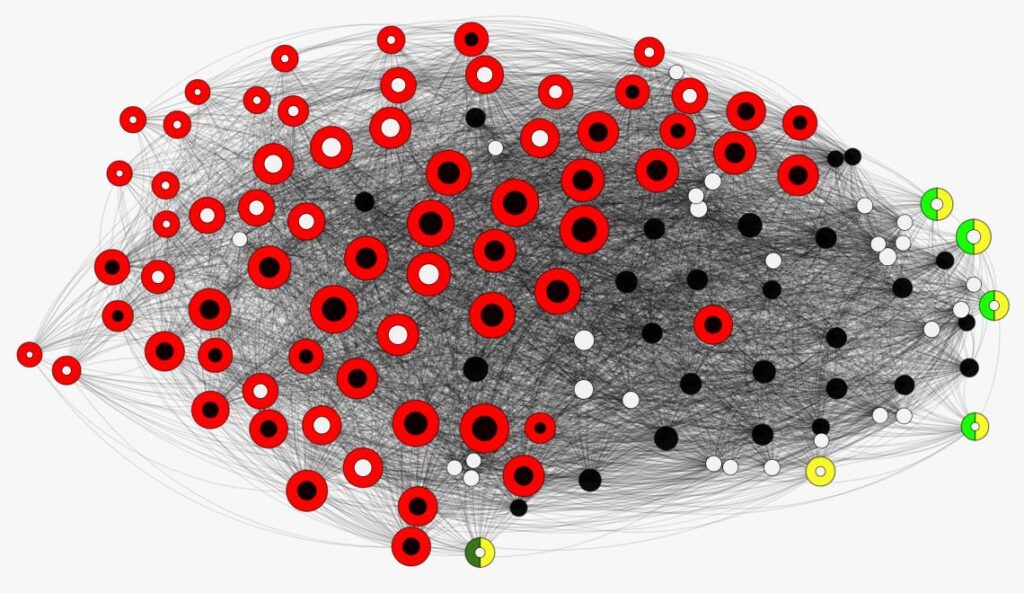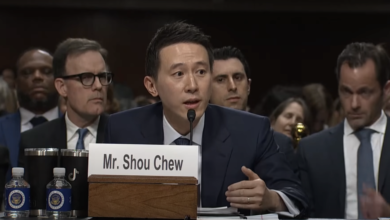Photo: Matthew Henry
The following article is republished from Tech for the People
If you’ve missed the news about shady tech surveillance company Babel Street this year, you could be forgiven. The first major article about them dropped in Protocol on March 5 right as the United States was beginning to realize what COVID-19 really meant.
Protocol’s report revealed one of the company’s products, “Locate X,” which allows historical tracking of phones that were in a designated search area. This can criminalize a person just by them being in a general location. And despite supposedly anonymizing the data, viewing the regular patterns of where a person goes can likely identify their home, office and frequent destinations, leading to de-anonymization.
Babel Street is one significant player in a growing field of data mining and analysis companies. These companies buy, process and sell data – or access to that data – for a fee, to corporate and government clients alike.
When the NSA announced it was ending its Section 215 phone metadata collection because it was too expensive and not productive enough, privacy advocates did not believe for a second that surveillance was ending. Instead, the shift has been to relying on private corporations, in order to save costs and avoid oversight or legal challenges.
Since the Protocol revelation, information about Babel Street has slowly trickled out. According to publicly-available federal contract information, the Secret Service, USSOCOM, State Department, CBP, ICE, Air Force, US Marshals Service, FBI, Transportation Security Administration and Health and Human Services have sought contracts with Babel Street directly or through through various resellers.
The next secret product: Babel Synthesis
Babel Street filed a service mark application with the US Patent and Trademark Office (USPTO) on November 5, 2020 – two days after the election – for Babel Synthesis. The application notes that Babel Synthesis has been in “use in commerce” since July 1, 2020.
In typical legalese, the application describes Babel Synthesis as:
Providing online, non-downloadable software used to collect, analyze, filter, store, track, manage, convert, interpret, categorize, index, extrapolate, compare, prioritize and produce databases, images, emails, files, documents, information, and data from online sources, websites and social media sites and to create reports in the fields of client-driven commercial, legal and governmental inquiries and investigations; providing online, non-downloadable computer search engine software; providing online, non-downloadable software for data mining for collecting and analyzing online information available from websites and social media sites; electronic commercial and governmental discovery consulting services, not related to litigation or legal matters, namely, consulting services in the field of data mining and electronic data discovery consulting services, not related to litigation or legal matters, namely, consulting services in the field of data mining
USPTO application 90300465 for Babel Synthesis
As is the case with Locate X, Babel Street does not prominently feature Babel Synthesis in the product list on its website. Two publicly-available documents on the United Kingdom’s GOV.UK Digital Marketplace give insight into the features of Babel Synthesis.
Babel Synthesis is not entirely a secret, though. A link from Babel Street’s own website to a LinkedIn post on Babel Street’s account which itself links to a Defense One article that summarizes and links to a document called Babel Beacon: “United States: Online views of the upcoming Presidential election & possible violence.”
In a 4-page Service Definition Document on the G-Cloud Marketplace, the product is given a short one-paragraph description:
Babel Synthesis leverages advanced artificial intelligence and machine learning to swiftly understand topics and thought leaders as well as conduct relationship analysis of associated networks and audiences. The software automatically compiles and visualizes these relationships enabling more fulsome analysis.
A separate pricing document on the same site lists Synthesis as one of the most expensive Babel Street products at £12,495/User. The only more expensive licenses are for “Babel X with Active Filters” when used with 1-10 or 11-25 users, at £15,190 and £13,970/User respectively.
In another document on the website of National Conference Services, Inc., Babel provides more details on what Synthesis does:
Babel Synthesis™ is designed to provide proactive & actionable insight when deployed against network or relationship data. Babel Street understands that true insight often depends on knowing who matters – the key influencers with the greatest potential to impact organizations, senior leaders, and world events. Babel Synthesis leverages a powerful combination of automated relationship network analytics, proprietary influencer mathematics, and artificial intelligence-based behavioral attribute models to rapidly map relationship networks and precisely identify the key influencers. With Babel Synthesis, users can visualize unstructured and relationship data, including sophisticated link analysis, geographic heat maps, influential entity carousels, topic clouds, patterns by time and day, and communication trends/style. Babel Synthesis is currently available as a stand-alone offering and is being directly integrated into other Babel Street products.
Babel Street’s Network Analysis
The addition of Babel Synthesis to Babel Street’s product offering helps the company close a loop in its offerings. Babel X “assigns and charts sentiment for social media.” Locate X provides searchable location information. Babel Channels summarizes news and thought leaders, “providing global situational awareness with voices from International, National and State levels.”
Babel Street plugs Synthesis as the next step in information analysis: revealing more than Babel X’s sentiment analysis and Channels’ news summaries, Synthesis is aimed at letting governments and corporations better understand supposed threats to them.

The above illustration comes from the same Babel Street Product Offerings document linked earlier. Of particular interest are the inclusions of “illicit/terrorist networks” and the imagery of a Molotov cocktail for “revealing insights in difficult to reach global environments.”
The capabilities of Babel Synthesis cannot be taken out of the current national and global context, or without consideration for who we know already uses Babel Street products.
In its Babel Beacon assessment of possible post-election violence, Babel Street itself provides an example of what Babel Synthesis is about:
“Babel Street also conducted a social media analysis using its artificial intelligence (AI) powered network analysis tool, Babel Synthesis, to better understand how users were connected and common themes among them. In Figure 3, a clear and dense association of Antifa-related accounts from across the United States – generated by Babel Synthesis’ network AI – can be seen where potential post-election violence was a common theme… the AI-enabled analysis indicates a network with strong interconnections and a high turnout for mobilization.”

According to the document, red circles are “Antifa” or others on the far-left, while yellow and green circles are “journalists who regularly report on far-left developments.”
Each of the circles in this map is an online account, linked to other accounts by a connecting line. The larger circles have more influence: they are liked, retweeted, commented on, etc more often than the others. Behind each of those accounts is a person who could be of particular interest to corporations or government entities like the FBI and DHS. Simply interacting with an account advocating for resistance or rebellion has the potential to put you on a watch list.
Babel Street does mention Q Anon and Boogaloo Bois in the document, but does not dedicate nearly as much space to them. The use of the Molotov cocktail imagery combined with the only real public reference to Babel Synthesis being focused on leftist protesters and organizers – in conjunction with the known government customers of Babel Street – only means increased surveillance.
Their Sources: Our Data
With Locate X, Protocol reported that the product uses “data that popular cell phone apps collect to enable features like mapping or targeted ads, or simply to sell it on to data brokers.” These data brokers then package and re-sell the data. The government can purchase it directly, or contract a service like Locate X or a variety of other similar offerings from the private sector to search and analyze the data. Either way, they bypass legal protections against warrantless searches provided in the Carpenter v. United States ruling, where the Supreme Court ruled that the government must get a warrant to acquire location data from a cellular provider.
For Babel Synthesis, the data is our every interaction on social media. Especially for public accounts, services provide insight into every like, comment and share. It’s safe to assume that the larger networks like Facebook, Twitter and Instagram are already being tapped along with smaller networks and services; Babel Street also mentions information from Telegram in their election analysis document. It’s also who we’re following, friends with, or even unfollowing: Each of these are a signal of how we view another account and the individual or organization behind it.
Those who use ‘alt accounts’ without their names or pictures associated with them are similarly not safe. Unless extreme precaution is taken when setting up with and interacting with the account: Creating and posting to it from a computer not used for your other accounts, using the Tor browser whenever using it, posting at varying times of day and days of the week, not following all of the same people, even changing your language patterns when you write – your identity can easily be linked to the account.
In the case of a Twitter alt, the government could get a warrant for information on a specific account, including the IP address used to connect to it. Twitter would provide this information, then the government would similarly get account information from the owner of that IP address, Comcast for example. That information will at least link back to a location and account owner.
The safest thing to do is be careful of who you’re interacting with and how when online. Imagine that a prosecutor is reading out every post you’ve liked – or made yourself – in front of a jury, or that they’re on the cover of the New York Times.






